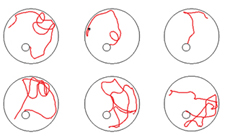How do our brains stay healthy? Until quite recently, most scientists believed each brain is allotted a fixed number of nerve cells that gradually degenerate and die without being replaced. Fortunately for us, science has since overturned this dogma: Certain regions of the adult brain do, in fact, retain their ability to maintain cell renewal throughout life. But this discovery raises new riddles: How does the brain know when and how to produce new brain cells?
This question has been puzzling scientists, mainly because the central nervous system (CNS) - the brain and spinal cord - has been viewed as a sort of Forbidden City, guarded by well-established border controls. These controls supposedly prevent the entry of immune system cells - the cells responsible for fighting infection and promoting healing and renewal - as they present a possible threat to the complex and dynamic nerve cell networks. Immune cells that recognize the body’s own components (autoimmune cells) are considered even more dangerous, as they can induce autoimmune diseases. Although autoimmune cells are often detected in a healthy CNS, their presence there is generally explained as a failure of the body’s "border police" to eliminate them.
A team led by Prof. Michal Schwartz of the Weizmann Institute’s Neurobiology Department, however, has a different explanation. They had demonstrated that strictly controlled levels of autoimmune cells have the potential to fight off debilitating degenerative conditions that can afflict the CNS, such as Alzheimer’s and Parkinson’s diseases, glaucoma and nerve degeneration resulting from trauma or stroke. Earlier research by Schwartz and her team suggested that these T cells - specialized immune cells that have the ability to recognize CNS components - are not enemies attacking the brain but friendly forces that help the brain to safely fight off outflows of toxic substances from damaged nerve tissues.
In a recent study published in Nature Neuroscience, the scientists showed that, in addition to preventing disease, these immune cells may be key players in the body’s campaign to maintain a normal, healthy brain. They worked with rats kept in an environment rich in mental stimulation and opportunities for physical activity, which is known to fuel the formation of new nerve cells in the hippocampus (a memory-related brain region). The Weizmann Institute scientists showed for the first time that this nerve cell renewal (called neurogenesis) is linked to local immune activity. But are T cells really to thank for this, as Schwartz suspected, or are other factors responsible?
To answer this question, the team conducted a series of experiments. They first repeated the above experiment using mice that lack a number of important immune cells, including T cells. Though housed in an enriched environment, these immunodeficient mice didn’t exhibit the increase in brain-cell renewal seen in the trials with normal mice. When the scientists repeated the experiment, this time with mice missing only the T cells, they again found impaired neurogenesis, confirming that T cells themselves were the critical factor in forming new brain cells.
In yet another set of experiments, they found that mice possessing certain CNS-specific T cells (those that recognize brain proteins) performed better in some memory tasks than mice lacking the cells. These findings, taken together, led them to suspect that the primary role of the CNS-specific T cells is to enable certain brain regions to form new nerve cells so as to maintain the capacity for learning and memory, and that their observed role in pathological situations is an extension of this primary role. The work is an outcome of a long-term collaborative effort of Prof. Schwartz and Dr. Jonathan Kipnis (a former student and post-doctoral fellow in Schwartz’s lab and now assistant professor at the University of Nebraska), together with graduate students Yaniv Ziv, Noga Ron and Oleg Butovsky, and in collaboration with Dr. Hagit Cohen of the Ben-Gurion University of the Negev, Beersheba.
Schwartz points out that autoimmune T cells don’t affect levels of intelligence or motivation; rather, they allow the organism to achieve the full potential of its brainpower. "These findings," she says, "give new meaning to ‘a healthy mind in a healthy body.’ They open up exciting new prospects for the treatment of cognitive loss." Knowledge that the immune system contributes to nerve cell renewal may have far-reaching implications for the elderly, in particular, because aging is known to be associated with a drop in immune system function accompanied by a decrease in new brain cell formation and memory skills. By manipulating and boosting the immune system, it might be possible to prevent or slow age-related memory loss.
Prof. Michal Schwartz's research is supported by the Nella and Leon Benoziyo Center for Neurological Diseases; the Carl and Micaela Einhorn-Dominic Brain Research Institute; the Alan T. Brown Foundation to Cure Paralysis; Mr. and Mrs. Irwin Green, Boca Raton, FL; Mr. Gerald Kaufman, Chicago, IL; and Mr. and Mrs. Richard D. Siegal, New York, NY. Prof. Schwartz is the incumbent of the Maurice and Ilse Katz Professorial Chair of Neuroimmunology.

'T' for Trauma
In addition to the maintenance of brain cell renewal and cognitive abilities, T cells that recognize brain antigens may improve the ability of mice to cope and to adapt their behavior to stressful life events. Mice that lack these cells manifest responses typical of those of post-traumatic stress disorder (PTSD). This finding of Drs. Cohen and Kipnis and Prof. Schwartz's team has recently been published in the Journal of Neurobiology.
Schwartz says that these results may, in the future, lead to the development of T-cell-based vaccines, which might be used to help prevent the development of PTSD following stressful episodes.
 Oleg Butovsky%2C Noga Ron%2C Prof. Michal Schwartz and Yaniv ziv. Mental immunity.jpg)
